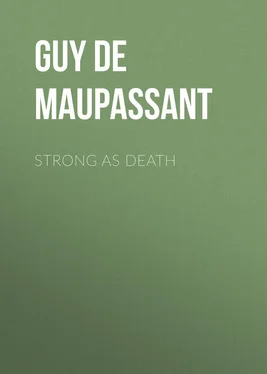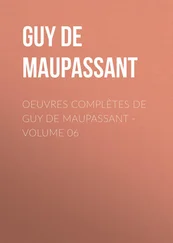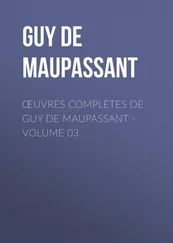Guy Maupassant - Strong as Death
Здесь есть возможность читать онлайн «Guy Maupassant - Strong as Death» — ознакомительный отрывок электронной книги совершенно бесплатно, а после прочтения отрывка купить полную версию. В некоторых случаях можно слушать аудио, скачать через торрент в формате fb2 и присутствует краткое содержание. Жанр: literature_19, foreign_antique, foreign_prose, на английском языке. Описание произведения, (предисловие) а так же отзывы посетителей доступны на портале библиотеки ЛибКат.
- Название:Strong as Death
- Автор:
- Жанр:
- Год:неизвестен
- ISBN:нет данных
- Рейтинг книги:4 / 5. Голосов: 1
-
Избранное:Добавить в избранное
- Отзывы:
-
Ваша оценка:
- 80
- 1
- 2
- 3
- 4
- 5
Strong as Death: краткое содержание, описание и аннотация
Предлагаем к чтению аннотацию, описание, краткое содержание или предисловие (зависит от того, что написал сам автор книги «Strong as Death»). Если вы не нашли необходимую информацию о книге — напишите в комментариях, мы постараемся отыскать её.
Strong as Death — читать онлайн ознакомительный отрывок
Ниже представлен текст книги, разбитый по страницам. Система сохранения места последней прочитанной страницы, позволяет с удобством читать онлайн бесплатно книгу «Strong as Death», без необходимости каждый раз заново искать на чём Вы остановились. Поставьте закладку, и сможете в любой момент перейти на страницу, на которой закончили чтение.
Интервал:
Закладка:
The lady allowed herself to be admired, quite content to be pretty and to please him.
No longer in her first youth, but still beautiful, not very tall, somewhat plump, but with that freshness which lends to a woman of forty an appearance of having only just reached full maturity, she seemed like one of those roses that flourish for an indefinite time up to the moment when, in too full a bloom, they fall in an hour.
Beneath her blonde hair she possessed the shrewdness to preserve all the alert and youthful grace of those Parisian women who never grow old; who carry within themselves a surprising vital force, an indomitable power of resistance, and who remain for twenty years triumphant and indestructible, careful above all things of their bodies and ever watchful of their health.
She raised her veil and murmured:
“Well, you do not kiss me!”
“I have been smoking.”
“Pooh!” said the lady. Then, holding up her face, she added, “So much the worse!”
Their lips met.
He took her parasol and divested her of her spring jacket with the prompt, swift movement indicating familiarity with this service. As she seated herself on the divan, he asked with an air of interest:
“Is all going well with your husband?”
“Very well; he must be making a speech in the House at this very moment.”
“Ah! On what, pray?”
“Oh – no doubt on beets or on rape-seed oil, as usual!”
Her husband, the Comte de Guilleroy, deputy from the Eure, made a special study of all questions of agricultural interest.
Perceiving in one corner a sketch that she did not recognize, the lady walked across the studio, asking, “What is that?”
“A pastel that I have just begun – the portrait of the Princesse de Ponteve.”
“You know,” said the lady gravely, “that if you go back to painting portraits of women I shall close your studio. I know only too well to what that sort of thing leads!”
“Oh, but I do not make twice a portrait of Any!” was the answer.
“I hope not, indeed!”
She examined the newly begun pastel sketch with the air of a woman that understands the technic of art. She stepped back, advanced, made a shade of her hand, sought the place where the best light fell on the sketch, and finally expressed her satisfaction.
“It is very good. You succeed admirably with pastel work.”
“Do you think so?” murmured the flattered artist.
“Yes; it is a most delicate art, needing great distinction of style. It cannot be handled by masons in the art of painting.”
For twelve years the Countess had encouraged the painter’s leaning toward the distinguished in art, opposing his occasional return to the simplicity of realism; and, in consideration of the demands of fashionable modern elegance, she had tenderly urged him toward an ideal of grace that was slightly affected and artificial.
“What is the Princess like?” she asked.
He was compelled to give her all sorts of details – those minute details in which the jealous and subtle curiosity of women delights, passing from remarks upon her toilet to criticisms of her intelligence.
Suddenly she inquired: “Does she flirt with you?”
He laughed, and declared that she did not.
Then, putting both hands on the shoulders of the painter, the Countess gazed fixedly at him. The ardor of her questioning look caused a quiver in the pupils of her blue eyes, flecked with almost imperceptible black points, like tiny ink-spots.
Again she murmured: “Truly, now, she is not a flirt?”
“No, indeed, I assure you!”
“Well, I am quite reassured on another account,” said the Countess. “You never will love anyone but me now. It is all over for the others. It is too late, my poor dear!”
The painter experienced that slight painful emotion which touches the heart of middle-aged men when some one mentions their age; and he murmured: “To-day and to-morrow, as yesterday, there never has been in my life, and never will be, anyone but you, Any.”
She took him by the arm, and turning again toward the divan made him sit beside her.
“Of what were you thinking?” she asked.
“I am looking for a subject to paint.”
“What, pray?”
“I don’t know, you see, since I am still seeking it.”
“What have you been doing lately?”
He was obliged to tell her of all the visits he had received, about all the dinners and soirees he had attended, and to repeat all the conversations and chit-chat. Both were really interested in all these futile and familiar details of fashionable life. The little rivalries, the flirtations, either well known or suspected, the judgments, a thousand times heard and repeated, upon the same persons, the same events and opinions, were bearing away and drowning both their minds in that troubled and agitated stream called Parisian life. Knowing everyone in all classes of society, he as an artist to whom all doors were open, she as the elegant wife of a Conservative deputy, they were experts in that sport of brilliant French chatter, amiably satirical, banal, brilliant but futile, with a certain shibboleth which gives a particular and greatly envied reputation to those whose tongues have become supple in this sort of malicious small talk.
“When are you coming to dine?” she asked suddenly.
“Whenever you wish. Name your day.”
“Friday. I shall have the Duchesse de Mortemain, the Corbelles, and Musadieu, in honor of my daughter’s return – she is coming this evening. But do not speak of it, my friend. It is a secret.”
“Oh, yes, I accept. I shall be charmed to see Annette again. I have not seen her in three years.”
“Yes, that is true. Three years!”
Though Annette, in her earliest years, had been brought up in Paris in her parents’ home, she had become the object of the last and passionate affection of her grandmother, Madame Paradin, who, almost blind, lived all the year round on her son-in-law’s estate at the castle of Roncieres, on the Eure. Little by little, the old lady had kept the child with her more and more, and as the De Guilleroys passed almost half their time in this domain, to which a variety of interests, agricultural and political, called them frequently, it ended in taking the little girl to Paris on occasional visits, for she herself preferred the free and active life of the country to the cloistered life of the city.
For three years she had not visited Paris even once, the Countess having preferred to keep her entirely away from it, in order that a new taste for its gaieties should not be awakened in her before the day fixed for her debut in society. Madame de Guilleroy had given her in the country two governesses, with unexceptionable diplomas, and had visited her mother and her daughter more frequently than before. Moreover, Annette’s sojourn at the castle was rendered almost necessary by the presence of the old lady.
Formerly, Olivier Bertin had passed six weeks or two months at Roncieres every year; but in the past three years rheumatism had sent him to watering-places at some distance, which had so much revived his love for Paris that after his return he could not bring himself to leave it.
As a matter of custom, the young girl should not have returned home until autumn, but her father had suddenly conceived a plan for her marriage, and sent for her that she might meet immediately the Marquis de Farandal, to whom he wished her to be betrothed. But this plan was kept quite secret, and Madame de Guilleroy had told only Olivier Bertin of it, in strict confidence.
“Then your husband’s idea is quite decided upon?” said he at last.
“Yes; I even think it a very happy idea.”
Then they talked of other things.
She returned to the subject of painting, and wished to make him decide to paint a Christ. He opposed the suggestion, thinking that there was already enough of them in the world; but she persisted, and grew impatient in her argument.
Читать дальшеИнтервал:
Закладка:
Похожие книги на «Strong as Death»
Представляем Вашему вниманию похожие книги на «Strong as Death» списком для выбора. Мы отобрали схожую по названию и смыслу литературу в надежде предоставить читателям больше вариантов отыскать новые, интересные, ещё непрочитанные произведения.
Обсуждение, отзывы о книге «Strong as Death» и просто собственные мнения читателей. Оставьте ваши комментарии, напишите, что Вы думаете о произведении, его смысле или главных героях. Укажите что конкретно понравилось, а что нет, и почему Вы так считаете.












